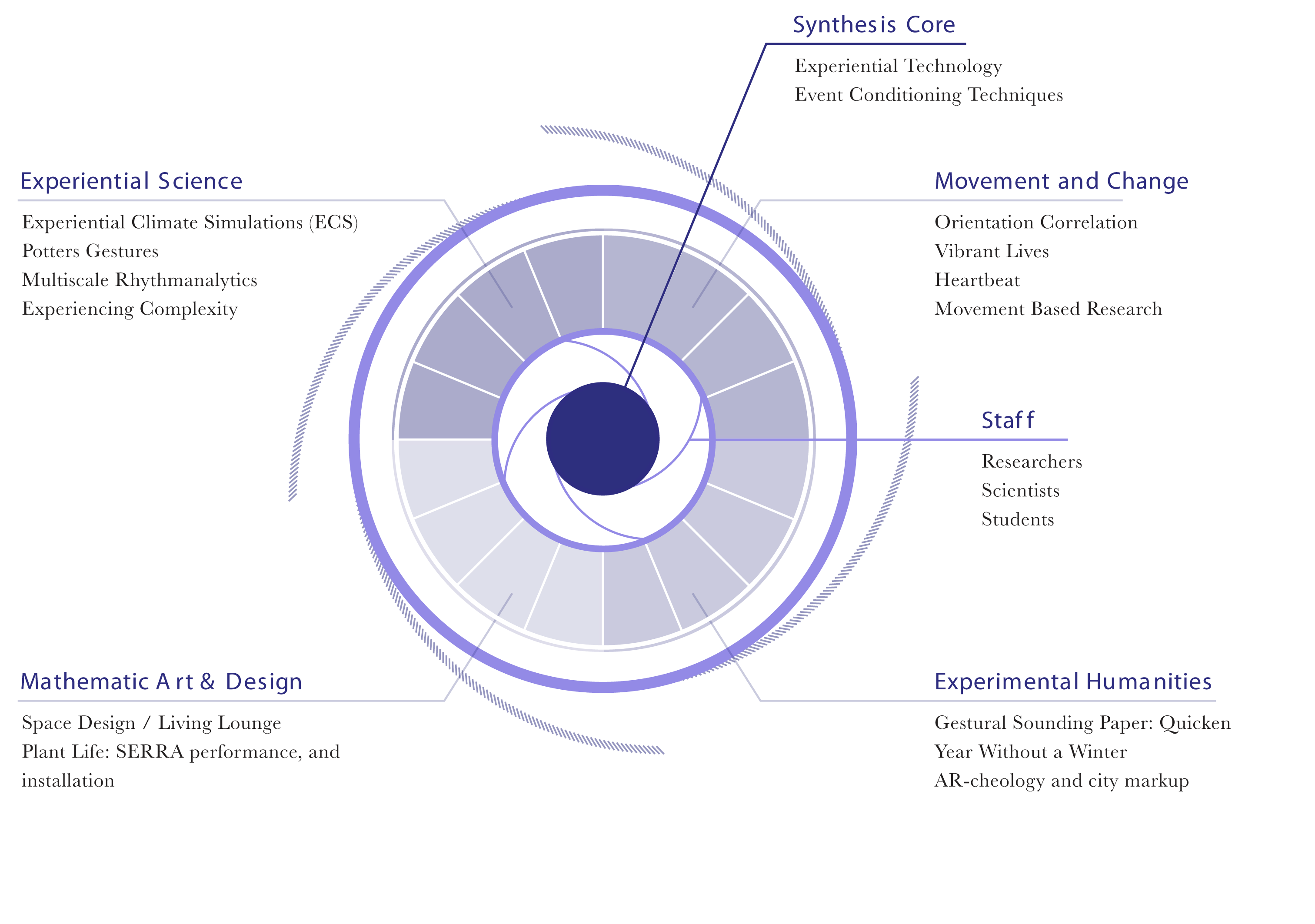Who We Are
Mission and Vision
Computer-driven media now circulate and activate images, sound and objects at densities greater than human limits of comprehension. We face the limits of effectively managing the technologies that activate our everyday world. Our challenge is how to build and inhabit environments that leverage the power of emerging technologies for shelter, sociality and play.
We pursue our mission by developing new practices for imagining and creating worlds that do not burden but enliven experience. We design technologies and techniques for animating environments that are richer but not more complicated, by asking how can we create worlds that we would want to live in?
We are building an ecology of practices for imagining and making the worlds we inhabit.
Infrastructure
The Synthesis Center is a place – a social construct designed to redistribute the intellectual, economic, and social energy of different disciplines to create fresh knowledge. Like any place it is built out of:
- a physical space where people can gather, work, and communicate with each other
- a group of people who live and work together in accordance with shared goals
- the capacity to support the conversations and work of its members
How It Works
Our place functions like a wheel spinning on an axis. We provide the axis to transfer the energy of our participants, and the grease to keep the wheel spinning true. To spin the wheel our participants provide energy in the form of external funding, time, special technology, work.

Modern AlchemyThe Story of Synthesis
The familiar form of science which has come to dominate our present era emerged from alchemical practices in the 17th century. Along the way it introduced a rift with long-lasting consequences. The Newtonian description of the world as a mechanical system with direct transmission of force by physical contact became the basis of the new mode of inquiry. Any phenomenon that could not be expressed in the manner of such mechanical laws fell into disregard.
Newton was both the first modern scientist and the last alchemist. His work on mechanics provided science with its model practice; ever since then physics has sought universal mechanical explanations. Gravitation, which Newton introduced as a universal law, was deemed ‘occult’ by his contemporaries because it invoked action at a distance and did not fit mechanical explanation. To this day gravity remains a challenge for science.
The reductive mechanistic approach disregards local knowledge and its fertile twining with the material world into rich, affective practices Privileging the mechanical over organic relations and phenomena has produced a disregard for natural and cultural habitats, which eventually impoverishes even the most privileged societies.
In recent years the limits of reductive science have become apparent: its innovative potential is increasingly exhausted and the value of its kind of progress is questioned. We begin to see the boundaries between these ‘two cultures’ as more permeable. The supposed dichotomy between man and animal, the supposed passivity of plants, and the supposed inertness of matter are increasingly recognized as biases, not facts. These biases can be dismantled with fertile results. Extending questions of consciousness to animal and vegetable life, for instance, has recently revealed complex supporting interactions among plants and their ecosystems.
New fields of study open up if we turn an unbiased attention to science before its fragmen-tation into physics, biology, psychology and philosophy, and to techne before its fragmentation into arts and engineering. We build a scientific practice that returns to, and benefits from, amodern modes of inquiry and draws on the fullness of amodern intuition. However, to do more than merely setting the clock back, the new science we propose draws power from a new humanities – the practices of making meaning.
Poiesis, the art of creation, precedes theory-building, and theory-building precedes methodology, because methodology repeats a process that no longer generates knowledge. Therefore the arts and humanities play a central role in creating fresh knowledge. But how can engineers and humanists learn more effectively from artists other than beholding their singular products, and vice-versa?
Synthesis hosts research clusters, each motivated by an experimental question or proposition inspiring equally two or more investigators. To be productive, this sort of deep transdisciplinary research and learning requires respect and patience for alien norms of what counts as a contribution. As a community Synthesis works on the Principle of Charity: “I don’t know what you’re talking about. But I grant that you know what you’re talking about. So I’ll come back and work with you again.” To this communicative principle we add a new collective practice – a modern alchemy.
Alchemy was the art of transmuting bodies and substances, the quick and the dead, the inert becoming vital, accidentals and essences becoming quintessences. Five centuries ago, alchemy was a practical and magical art, concerned with bodies and materials that are always suffused with ethical, vital and material power. Under the prism of the Enlightenment, such practices split into the practical (e.g. engineering or medicine), the scientific, and the art of the imaginary. Our work fuses these arts together again to transmute the material of social relations.
Synthesis provides a place for experimentally inventing and fusing fresh practices of understanding how the world works with fresh practices of making meaning. The motto “Art all the way down” implies that we cannot do business as usual by simply identically reproducing ourselves : our apprentices will learn but differ from the professions under which we were trained. We create stronger alloys of the know-hows and know-thats we have inherited from the past 500 years of knowledge creation. This is the basis for our choice of themes and affiliates. Transdisciplinary research is more than merely sitting an engineer and an artist and a philosopher in a room; it means transforming each discipline’s own ways of doing things, with care.